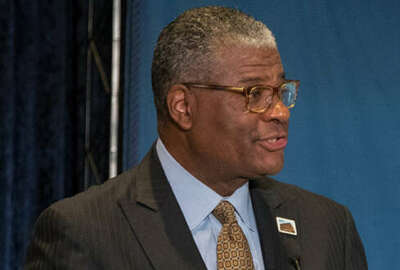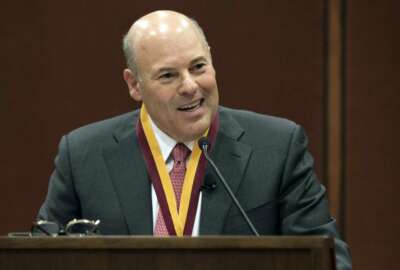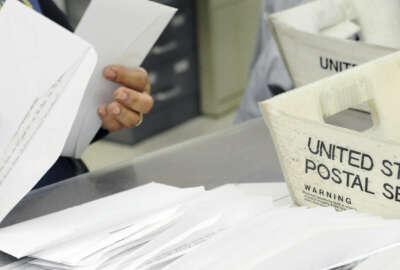
USPS board nominees see no ‘easy answers,’ but common ground for postal reform
The Postal Service Board of Governors lost its quorum this week, with Deputy Postmaster General Ron Stroman stepped down, but the Trump administration has two...
The Postal Service Board of Governors lost its quorum this week, with Deputy Postmaster General Ron Stroman stepping down. But the Trump administration has two nominees for the board in the pipeline.
Donald Lee Moak, a former Delta Airlines pilot and former president of the Air Line Pilots Association, and Bill Zollars, the former chairman of the logistics company YRC Worldwide, told members of the Senate Homeland Security Committee that setting a long-term business plan and redefining the Postal Service’s universal service obligation to deliver mail six days a week rank among their top priorities if confirmed.
Both Moak and Zollars would join the top ranks of USPS at a time when the agency warns it will run out of cash by the end of September – or May 2021, if USPS and the Treasury Department can reach an agreement on the $10 billion loan guaranteed to the mail agency under the CARES Act.
While the coronavirus has led to an accelerated decline in mail revenue, the Postal Service’s financial problems began well before the pandemic. The agency has deferred on billions in payments to pre-fund postal retiree health benefits under a 2006 law, and has struggled to meet its pension liabilities.
Congress, the Trump administration, postal unions and other groups have generally agreed that postal reform is needed, but butted heads in recent years over what it looks like.
Moak said the recommendations from a White House task force outline many of the key issues for postal reform, including redefining the universal service obligation. The Postal Regulatory Commission has also agreed that Congress and the Postal Service should redefine the USO as part of a larger postal reform platform.
“Interweaved all through the report is the concept that Congress has to make some decisions, and they need to work with not only the Board of Governors, the PRC, the USPS management to define not only USO in more specificity, but also what they want USPS to be going forward,” Moak said at Tuesday’s hearing.
President Donald Trump has criticized the Postal Service for not charging e-commerce companies more to deliver packages, especially when it delivers packages the “last mile” to rural areas where its private-sector companies don’t do business.
Read more: Management News
However, Zollars said USPS has an opportunity to leverage last-mile delivery “in a way that we haven’t fully embraced at this point.”
“It’s clearly a sustainable advantage for the Postal Service and one that I really am interested in looking at more closely,” he said.
Both nominees are new to the inner workings of the Postal Service. During his tenure at YRC Worldwide, Zollars oversaw a logistic network with 50,000 employees, but setting business decisions for the USPS and its 600,000-employee workforce would come with its own unique challenges.
Later this month, logistics executive Louis DeJoy will take over as the next postmaster general, and will serve the first postmaster general in more than 20 years without prior experience working at the agency.
Redefining the USO will require Congress and the Postal Service to answer fundamental questions about what level of delivery service the American public needs, and how the Postal Service should cover its costs to meet that obligation.
USPS is currently required to deliver mail to 160 million addresses six days a week, and Congress in the past has given bipartisan pushback to the idea of cutting mail service down to five days a week.
Sen. Kyrsten Sinema (D-Ariz.) said the challenge for the Postal Service remains its “dueling need to control costs due to falling mail volumes nationwide while also investing in service improvements, so the Postal Service can meet its mandate to provide service to every American.”
Read more: Budget News
“It’s always going to cost the Postal Service more to deliver the mail in rural areas. Letters and packages have to be carried over longer distances with less address density and higher gas costs,” Sinema said. “But rural America needs the Postal Service more than urban areas, and the Postal Service is a lifeline for rural communities and businesses.”
Zollars pointed out that the Postal Service remains the highest-rated federal agency in the popular opinion and that the balancing act of cutting costs while keeping customers happy reminded him of his prior experience in the logistics business.
“People would come to me and ask whether I wanted lower cost or better service, and my answer was always, ‘Yes, we want both,’ he said. “I don’t think on this one there are any easy answers, but it’s one that I’ve looked at before and I’m anxious to get into the USPS information and see what’s in there. I would expect this will be a central part of what I would be looking at.”
The House has repeatedly sought to give USPS emergency funding in each round of coronavirus spending, but the Trump administration has resisted those efforts. More recently, Treasury Secretary Steven Mnuchin said the agency may not need the $10 billion loan because of a surge in package revenue.
Sen. James Lankford (R-Okla.) said a significant increase in package revenue means the Postal Service will end this spring in better financial shape than the same period last year. While USPS management warned the pandemic could put a $25 billion dent in its revenue this year, Moak said the agency needs better real-time data to make business forecasts.
“What we need here in this situation with USPS is we need to get good data in a timely fashion so that the Congress, the Board of Governors and USPS management can make timely decisions and adjust quickly when need be,” he said.
Copyright © 2025 Federal News Network. All rights reserved. This website is not intended for users located within the European Economic Area.
Jory Heckman is a reporter at Federal News Network covering U.S. Postal Service, IRS, big data and technology issues.
Follow @jheckmanWFED
Related Stories

DeJoy to lead USPS as stakeholders try to reform business model ‘in peril’




